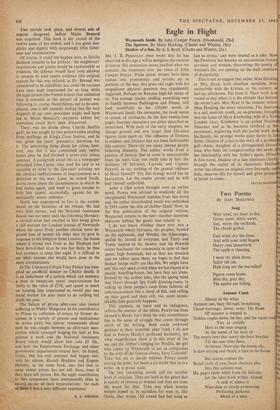Eagle in Flight
MR. J. B. PruEs-rt.EY once wrote that he has observed in this age a will to denigrate the massive in fiction. His contention seems justified when we consider the treatment over the years of John Cowper Powys. While minor writers have been rushed into prominence and written up as portents of the day, this great old eagle with his magnificent physical presence was consistently neglected. Perhaps he flies too high for many of us. The average reader, seeking something easy to handle between Paddington and Pinner, will look doubtfully at the 250,000 words of Weymouth Sands. On encounter, the book seems to smack of confusion. In the first twenty-four pages, fourteen characters are either described or mentioned. With each of the, early chapters we change ground and new larger than life-sized figures loom upon us. The influence of Dickens is evident, and Dickens has not been fashionable this century. There are too many intense people behaving intensely.. The author works from a premise of fantasy that to some is unacceptable from the start. Can one really take in turn the dottiness of Sylvanus, Lucinda and Captain Poxwell, to say nothing of the general oddness of Skald himself? Yet, this strange world has its fascination. Let the reader persist and he will find himself embroiled.
After a libel action brought over an earlier novel, Powys was advised to eradicate all the recognisable Weymouth features from this novel and the rather disembodied result was published in 1934 under the title of Jobber Skald. Now, in the first publication of the original version, Weymouth returns to the text—another immense character behind the giants that inhabit it.
I do not know whether there ever was a Weymouth where Sylvanus, the prophet, bawled on the esplanade, and Witchit, the fishmonger, smiled his hatred of everyone, and Tissty and Tossty danced at the theatre, and the Poxwell sisters fascinated the community in spite of their queer, high foreheads, but as they are revealed and we reflect upon them, we begin to feel that human beings really are like this. We might have met this very same crowd when we last stayed at a seaside boarding-house, but here they are trans- formed by the author who, like the spring wind that blows through Spy Croft drawing-room, 'is calling up these people's souls from fathoms of
subconsciousness like a shoal of fish, and calling up .their good and their evil, too, more unmis- takably than generally happens.'
This sentence, its tenor and its inelegance, reflects the manner of the whole. Powys has been
likened to Hardy but I think the only resemblance
lies in the sense of struggle that comes through much of the writing. Both made awkward gestures in their scramble after truth. I do not find in Po,wys Hardy's profound humanity, yet what magnificence there is in this story of the sea and the Jobber's longing for Perdita, the girl who comes to Weymouth to act as companion to the wife orthe famous clown, Jerry Cobbold I Time has yet to decide whether Powys stands among the great, but there is no doubt that he is a writer on a grand scale.
The two remaining novels call for another level of criticism. They are both in the genre that
is mainly of interest to women and they are none the worse for that. Time was when women writers hoped to be mistaken for men or, like Ouida, they wrote, All rowed fast but none as
fast as stroke,' and were treated as a joke. No the Feminine has become an autonomous literar province and women, discovering the poetry o woman's life, are opening up the dark continen of domesticity.
This is not to suggest that either Miss Hockin or Mrs. Byatt, both excellent novelists, deal exclusively with the kitchen, or the nursery, o feet-up afternoons. Far from it. Their work is as varied as any other; it is the attitude that denot the writer's sex. Mrs. Byatt is the sounder writer; Miss Hocking the more vivacious. The Sparrow is a sad, neurotic youth, an ex-prisoner, brough into the home Of Myra Kimberley, wife of a Wes 11 London vicar. Kimberley is an ardent Nuclea Ii Disarmer and as he becomes involved in th movement, neglecting both his parish work an his family, his protégé works quiet havoc in hi home. Shadow of a Sun is the story of a proble girl—Anna, daughter of a distinguished literar man, who finds the companionship she needs i Ii her relationship with her father's agent, Oliver r. A first novel, Shadow of a Sun impresses chiefl through the reality of its characters. Neithe writer has chosen an original story but each, on ii feels, observes life for herself and gives promis of better to come.
OLIVIA MANNIN






























 Previous page
Previous page